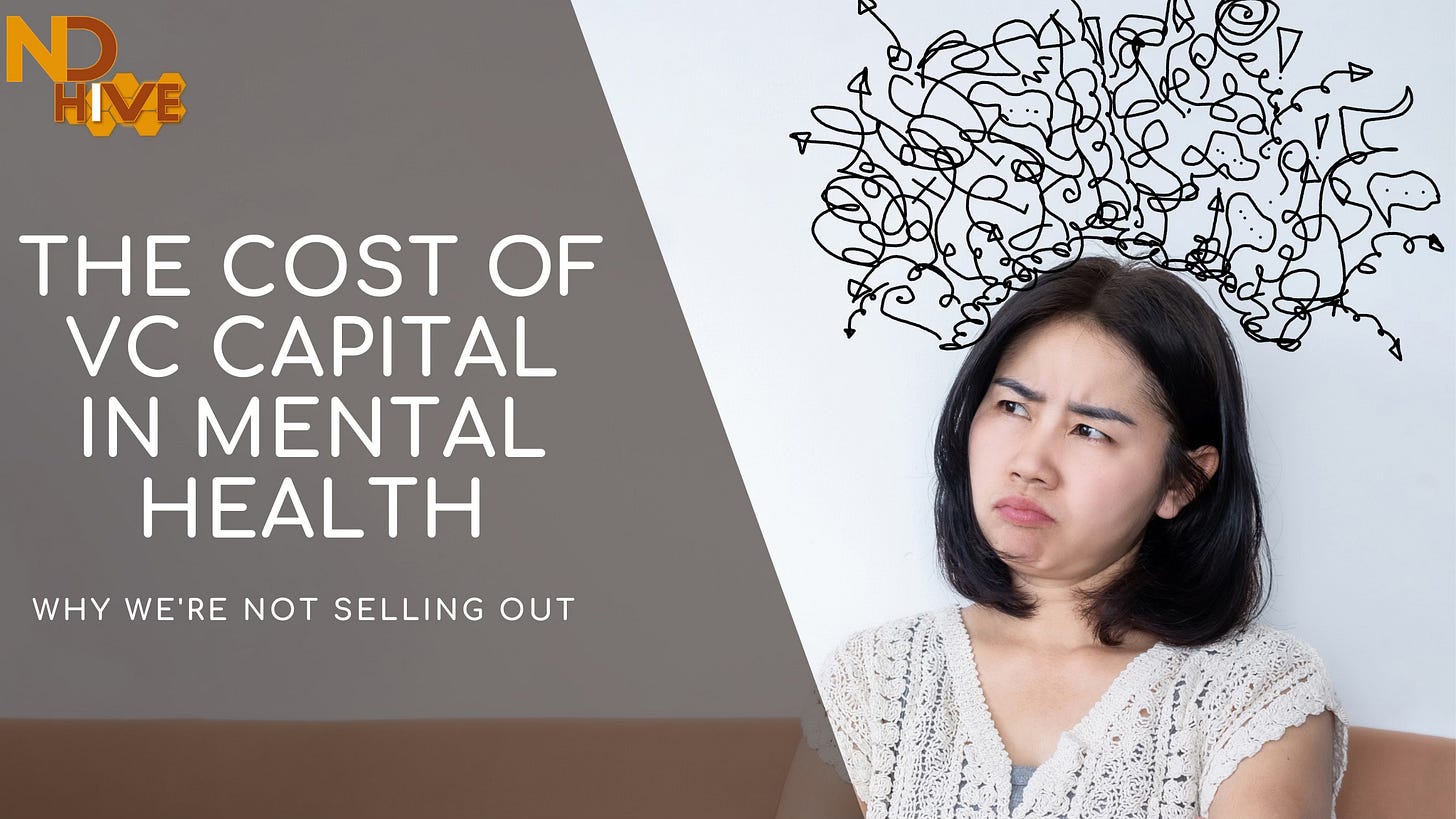If I wanted to be a millionaire by next year, I'd do everything differently. In all honesty, I know how to do that, and it's a whole lot easier than the path I am on now.
I'd chase panels and pitch competitions, polish up my "founder story" until it sparkled, and align our product roadmap to whatever trend was hot in Silicon Valley that week: AI life coaches, dopamine dashboards, subscription "accountability" platforms that deliver more alerts than actual support.
And sure, I'd be celebrated for it.
But here's the truth: we're not building for applause. We're not here to please the algorithm, go viral, or pitch to a boardroom full of people who have never lived with chronic pain, executive dysfunction, or a nervous system on the edge.
We're not chasing venture capital, because venture capital doesn't chase impact. It chases profit.
The Pattern: Big Capital, Bigger Drift
Here's what happens when VC enters the room:
A 2024 study found that over 50% of founders experience "mission drift" after taking VC funding. That means shifting away from their community's needs to prioritize growth at all costs.
Another study found: Mental health startups raised $4.5 billion in 2021, triple the year before. But companies like Cerebral and Done quickly became cautionary tales of over scaling, mismanagement, and compromised care.
Founders backed by significant capital often see their authenticity drop, even as their 'professional image' sharpens, a loss that's deeply felt in the community. IPO-hungry platforms are being built, scaled, and sold at lightning speed, turning what started as safe spaces into commodities for shareholders.
Let's be real: more funding doesn't equal more healing. It just moves the product further from the people who need it.
Online therapy Platforms have turned therapy into an assembly line. It's mass-produced, profit-driven, and stripped of its soul. Therapists aren't freelancers anymore. They're gig workers in a system that profits off and causes their burnout, a fundamentally unfair system.
These platforms promise freedom but deliver a tight, short, and gold-plated leash for investors.
When clients become data points, mental health is no longer mental health; it's mental health capitalism. Dashboards, deadlines, and data capture are replacing clinical autonomy. The process is no longer relational; it's just scalable.
This is the cost of "innovation" when profit leads the way.
What We're Building: And Why It's Different
We're not here to scale fast and exit.
We're here to build something that lasts. Something that belongs to the community it serves.
We're building:
Apps that support, not track
Coaching that centers lived experience, not checklists
Community that feels like community, not "user engagement" metrics
Our success will not be measured by acquisition or IPO. It will be measured by the number of people who feel safe, seen, and supported for the first time.
We know what it's like to be failed by every system. So we're not trying to fit into one.
We're creating something outside of all that.
Messy. Slow. Human. Real.
The Neurodivergent Community Deserves More
Let's be clear: the neurodivergent community has gone from pathologized to monetized. And STILL, we're not the ones in control.
After centuries of being institutionalized, silenced, and ignored, we're now being branded and sold.
Our identities aren't a business model. Our struggles aren't a revenue stream.
In the name of accessibility, tech platforms have funneled neurodivergent clients into neurotypical data systems that profit from and continue to cause distress.
They claim to empower us, but what they're doing is exploiting us, treating our needs as niches and our pain as product potential.
This isn't advocacy. It's systemic oppression with better UX.
Being Autistic, ADHD, or being Chronically ILL isn't a trend. It's not a brand. It's not a product category.
We've gone from being overlooked to over-marketed. And somehow, we're still not centered.
That's not progress. That's exploitation with better branding.
Why We Don't Want Your Millions—Unless You're Coming With Us
It's not about being anti-money, cause I would love to not worry about who I can afford to support and hire on my team.
It's about refusing to pay the price that often comes with it.
Here's what we will not do:
Compromise our community to please a board
Raise prices just to hit growth metrics
Rebrand ourselves out of reach of the people who need us most
We've watched too many platforms forget who they were built for the second the funding lands.
We won't be another one of those stories.
We're not building something pretty to pitch. We're building something that works.
And that means listening to our people, not to profit models.
Our Revolution is Relationship
Every single day, we get messages like:
"I've tried everything. Nothing worked... until now."
"Your platform actually feels like it was made for me."
"I don't feel broken here."
That's the metric that matters.
Could we raise a few million, cut corners, and strip out the soul? Probably.
But we didn't come here for the easy.
We came here for impact. For healing. For a revolution in how support feels.
So no, we're not selling out.
We're building in.
For our community.
With our community.
On purpose.
Want to Help Us Build It?
Here's how you can join the movement:
Subscribe so you don't miss what's next
Share this post with someone tired of the system, too
Support the work if you're able
Help us prove that you can build without selling out




